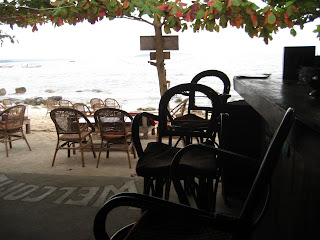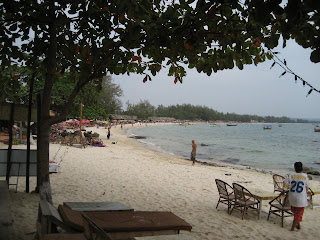

I took several buses and boats to get to Sihanoukville. The first boat was a small one to take us out to Tonle Sap lake were the larger and faster
 boat took us via lake and river to Pnom Phenn. The embarkation point is a sewage system with a village around it.
boat took us via lake and river to Pnom Phenn. The embarkation point is a sewage system with a village around it.
The fast boat was pretty amazing. We went by floating villages. Lots of houseboats.

On the Banks of the Tonle Sap river, the food is produced from farming, which employs pumps to irrigate the field in the dry season and fishing which was everywhere on the river.

The long boats are propelled by gas engines that swivel to direct the propeller to all orientations. To drag a net, the long boats extend a net from extensions on the front and back and propel the boat laterally
I took the first bus to Sihanoukville. The bus had two waitresses. A four hour ride, air conditioned, for $6 including snacks. Go figure.
Sihanoukville is a remarkable place. It has, of course white sandy beaches and hundreds of beach side shacks providing the usual for the usual suspects. Victims of land mines walk by asking for money. Blind men are led around by beautiful children doing the same. An elderly lady brought an very old man by. Hard to say no....
When the currents are right, lots of trash washes up on the shore.
 At first they tried to bury it in the sand. Several of us pointed out that the plastic would not decay if buried and would soon be exposed. So we all got in the water and helped collect the trash. Wonder where it comes from.
At first they tried to bury it in the sand. Several of us pointed out that the plastic would not decay if buried and would soon be exposed. So we all got in the water and helped collect the trash. Wonder where it comes from.

I spent four days in Sihanoukville. Mostly sitting in one of the beach-side shacks thinking about thermodynamics, sterling engines, sail boats and Cambodia.
Assuming the folks here are so inclined, I believe it is relatively easy to develop indigenous technologies to decrease dependence on foreign oil and foreign capital. Cambodia is a sunny place that has relatively low energy demands. Solar powered Sterling engines could easily supply all non-mobile energy needs. There are very simple sterling engine driven water pumps. On the beach they are blessed with plenty of sunshine and plenty of wind. Their energy needs are low: there is very little AC and refrigeration. A couple square meters of solar collectors and a 1 meter windmill on each shack could supply the bulk of the electric power needs. Due to the enormous amount of available solar and wind energy, these engines could be simple (sacrificing efficiency for cost) and made locally as opposed to buying a much more efficient and powerful solution abroad.
The boats in the rivers, lakes and oceans are not used continuously. While sitting idle, the sunshine and wind might charge simple batteries to supply the power needed for electric propulsion. This would reduce the need to buy gas and potentially the need to buy electricity.

Sterling engines and small wind generators are simple technologies relative to the ubiquitous motor cycle, cell phones and Internet. Since everyone knows how to operate and maintain them, there should be only a small learning curve to adopt these new technologies. I think getting people to switch to these new technologies would be quite challenging because it would be offered by an outsider, who naturally is not familiar with precise needs, politics, hidden costs, corruption and other pre-occupations.
I am off to Phnom Penh today and then to Brussels tomorrow.
No comments:
Post a Comment